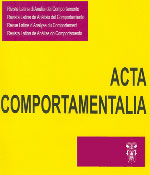A noção pragmatista de conhecimento e a noção skinneriana de conhecimento de si mesmo
DOI:
https://doi.org/10.32870/ac.v2i2.18294Palavras-chave:
Pragmatismo, filosofia, behaviorismo radical, relatos privados, auto-conhecimentoResumo
O pragmatismo é apresentado como uma atitude anti-representacionista, isto é, como uma crítica à idéia de fundamentação do conhecimento ou da verdade. Esta crítica torna-se possível a partir de uma interpretação funcional para o problema do conhecimento, segundo a qual as asserções (científicas ou no) constituem-se de recursos para ínteração com os fenômenos (elas não representam, portanto, uma realidade última ou perfeita. A tese pragmatista está articulada com uma concepção igualmente funcional de linguagem, sendo esta então interpretada enquanto forma de ação, e não enquanto sistema de representação do mundo. Tal concepção de linguagem implica, ainda, a impossibilidade de uma linguagem privada. O behaviorismo radical skinneriano é discutido à luz da oposição pragmatismo-representacionismo, examinando-se suas concepções de conhecimento em geral, de conhecimento científico e de conhecimento de si mesmo. Argumenta-se que Skinner desenvolve uma concepção pragmatista de conhecimento em geral e de conhecimento científico. No que diz respeito à noção de conhecimento de si mesmo, sustenta-se que Skinner distancia-se de uma postura pragmatista e de uma concepção funcional de linguagem. Sugere-se que tal distanciamento está articulado com o dualismo que persiste em sua distinção público-privado e com a suposição de que os "relatos sobre si mesmo" são imprecisos e carecem de valor científico.
Downloads
Downloads
Como Citar
Edição
Seção
Licença

<a rel="license" href="http://creativecommons.org/licenses/by-nc-sa/4.0/"><img alt="Licencia de Creative Commons" style="border-width:0" src="https://i.creativecommons.org/l/by-nc-sa/4.0/88x31.png" /></a><br />Este obra está bajo una <a rel="license" href="http://creativecommons.org/licenses/by-nc-sa/4.0/">licencia de Creative Commons Reconocimiento-NoComercial-CompartirIgual 4.0 Internacional</a>.






